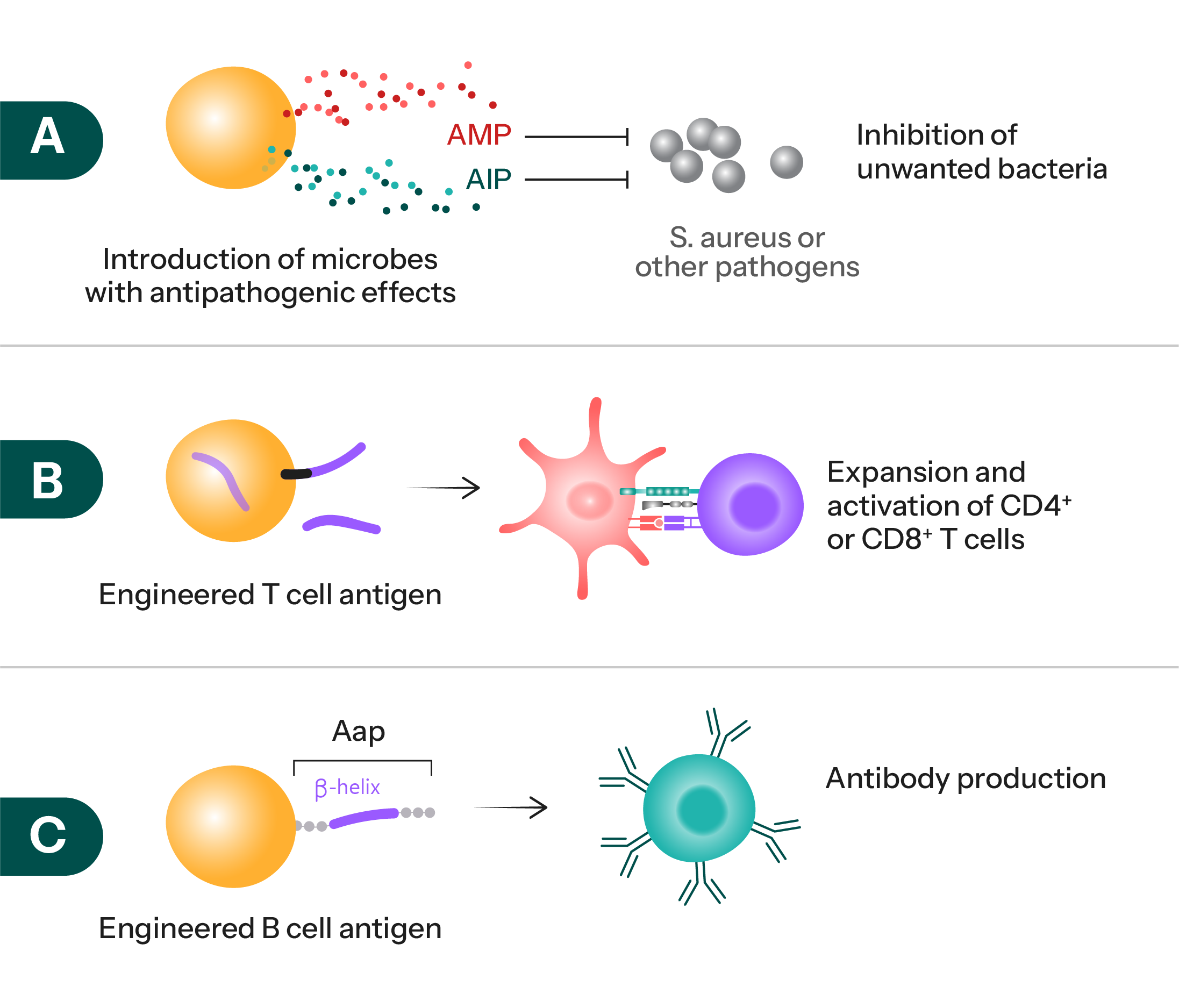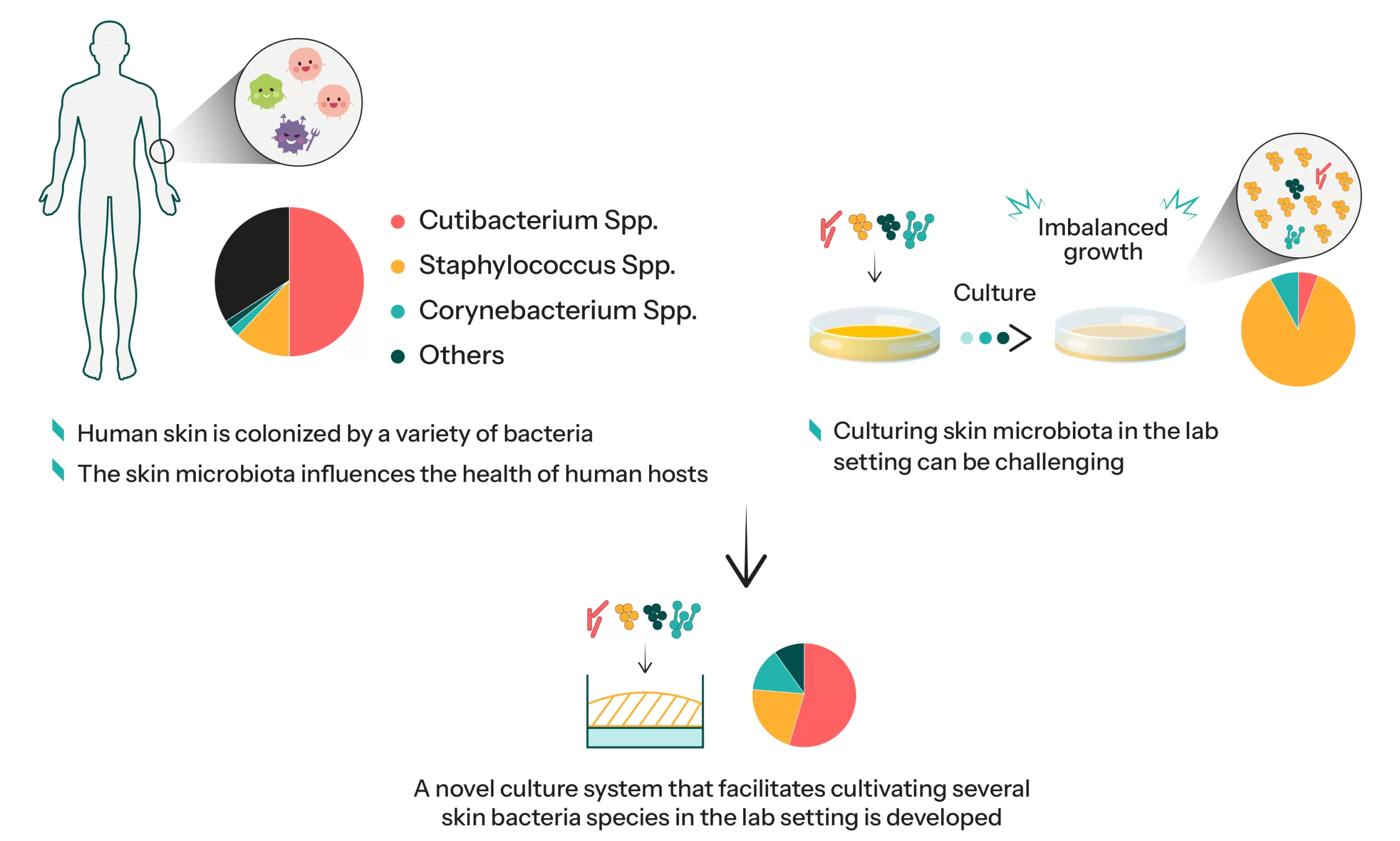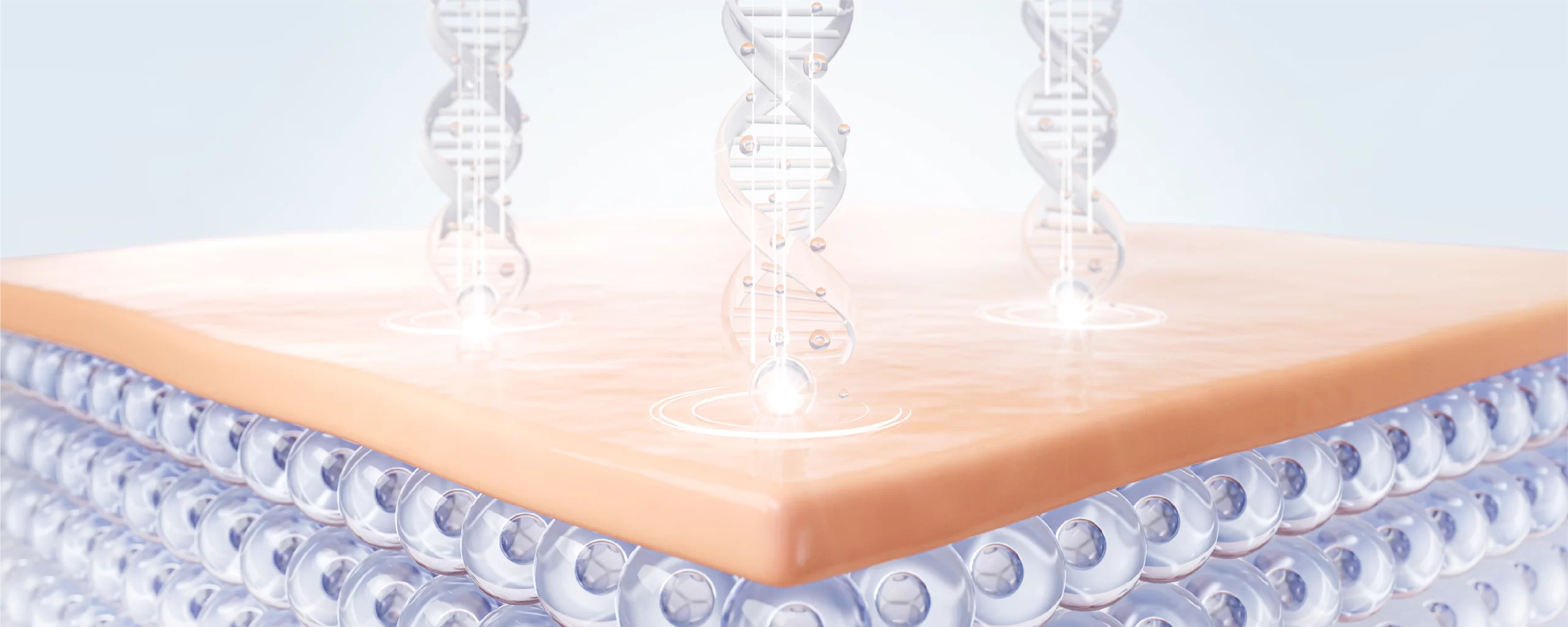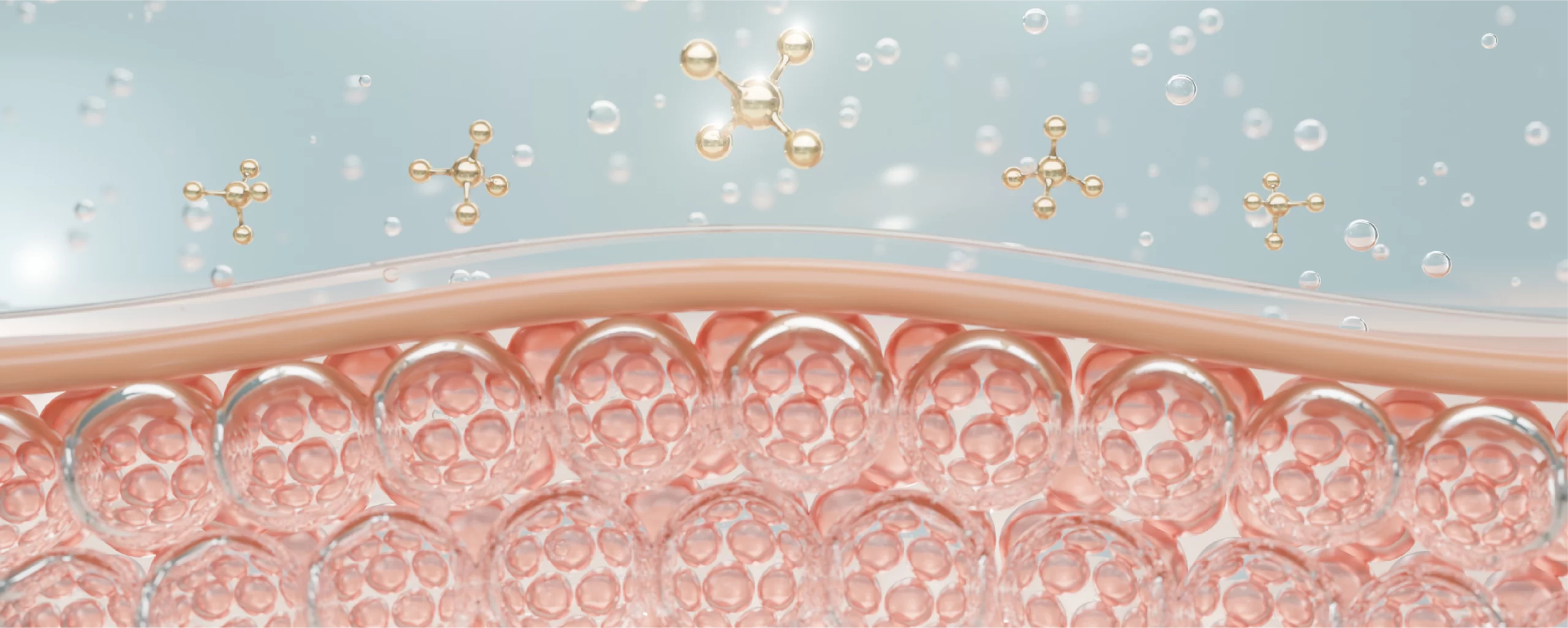Dermal Microbiome: The Emerging Epicenter of Personalized Skincare
Skin microbiome dysbiosis has been identified as the underlying cause of various concerning skin conditions, including melanoma, psoriasis, acne, and atopic dermatitis. The same stands true when it comes to its relationship with normal, healthy skin. The complex relationship between the skin microbiota and overall skin health has brought about a significant shift in the cosmetics industry’s perspective over the last decade. There is a concerted effort to create products that specifically preserve and support the skin’s microflora. This momentum aligns with a broader movement toward clean beauty and personalized skincare solutions. However, this write-up delves into the key drivers behind microbiome-friendly skincare, early research analysis, and how it is paving the path for more tailored solutions specific to individual body and skin type.
A Short Refresher on the Significance of Skin Microbiome
The skin is not only the largest organ in the human body, but also the second-largest in terms of microbial density, second only to the gut. Researchers have established that, just like the gut microbiome, changes in the skin microbiota can lead to various skin conditions and disorders. For instance, UV radiation has the power to alter the skin microbiome and generate a “UV-resistome,” which may lead to the initiation of skin cancer. Bacteria like Staphylococcus epidermis have demonstrated protective effects against melanoma. Strategies, such as bacteriophagy, that manipulate both gut and skin microbiomes can improve outcomes in melanoma therapy.

Figure 1: Skin Microbiome
Similarly, apart from skin diseases, the correlation between aging, acne, psoriasis, eczema, and the skin’s microflora has been well established in numerous studies. Hence, it is safe to say that studying and further analyzing the skin microbiome could be the key to addressing the biggest challenges currently plaguing the skincare industry.
Key Drivers
Early Research And Scientific Advancements
- The Expanding Universe of the ‘Biotics’ Family: Inclusion of prebiotics, postbiotics, and probiotics in skincare products has emerged as one of the key strategies for replenishing beneficial bacteria and restoring microbial balance. While prebiotics are non-living bacteria that provide nourishment to beneficial bacteria in the dermal ecosystem, probiotics comprise living bacteria that introduce required microbes to strengthen natural defenses, maintain hydration levels, and reduce inflammation in the skin. Postbiotics are probiotics’ metabolite byproducts, like peptides, short-chain fatty acids, and enzymes, that are beneficial to the skin. The Journal of Investigative Dermatology also recently demonstrated the effectiveness of biotics in topical applications and in oral supplements for enhancing skin barrier function and microbial stability.
- Innovations Simplifying Aging and the Microbiome Equation: A number of patents have been filed in recent years, focusing on microbiome-based skin health and anti-aging solutions. The key names include Dermala, Deep Longevity Microbiomic Aging Clock Patent, Codex Labs’ Patented Microbiome-Supporting Skincare Technology, Parallel Health’s Personalized Phage Therapy, and Phyla’s Patented Acne and Skin Microbiome Balancing System.
- Skincare Personalization: Recent advances in microbiome analysis and DNA sequencing are shedding light on a customized skincare regimen based on individual microbial profiles, deficiency assessments, and the type of applications (oral or topical) that can enhance the product’s efficacy
Rising Consumer Interest in Holistic and Clean Beauty Solutions
A growing number of consumers are willing to pay premiums for microbiome-based products as awareness of the microbial role in skin health increases. Moreover, the pressure for eco-friendly packaging and sourcing aligns closely with the growing interest in microbiome-based skincare solutions.
Strategic M&A
Several strategic partnerships, mergers, and acquisitions indicate a growing interest in microbiome-based products. For instance, L’Oreal recently acquired Lactobio to integrate its microbiome expertise in developing live-bacteria formulations. Similarly, Skinome and BioGaia are also focusing on probiotic-based products, and so is Symbiome.
Evolving Regulatory & IP Landscape
Patents, such as those from Dermala and Lactobio, have given them a strong edge in this market, along with increasing R&D investments. Along with the tightening of EU guidelines and FDA frameworks, there is a growing emphasis on prioritizing efficacy and safety in formulations.
Key Advancements in Skin Microbiota Research
Several advancements in the last few years have significantly shaped our understanding of the skin microbiome, its complex interactions with the host, and its impact on immunity, health, and the appearance of human skin. Most of these developments indicate an upcoming paradigm shift towards precision skincare. Here is a brief overview of the most important revelations that are steering the focus towards personalized solutions.
Skin Microbiome: Empowering Innovative Therapeutic Strategies. The complex interplay between skin microbiota, tissue integrity, and immune responses plays a significant role in dermatologic conditions such as atopic dermatitis. Several clinical trials are underway to demonstrate the pivotal role of microbiome-based therapeutics in restoring beneficial commensal bacteria that produce AIPs (autoinducing peptides) and AMPs (antimicrobial peptides) to limit the growth of pathogenic bacteria, such as Staphylococcus aureus. Engineering skin commensals is another innovative approach that triggers immune responses against melanoma tumours, demonstrating its role in microbiome manipulation under bacteriophage.

Figure 2: A Schematic Showing Emerging Skin Microbiome-based Therapeutic Approaches (Source)
Culture Systems for Skin Microbiota: Cultivation of multiple skin bacteria species together without disturbing their natural balance was a challenge recently solved by researchers at Tokyo University. They developed a co-culture medium that enables the simultaneous cultivation of the top skin bacteria. The framework not only preserves the balance of the human skin bacterial community but also opens doors to in-depth studies of microbial interactions, as well as the effects of skincare products on such microbial ecosystems.

Figure 3: Novel Culture System for Balanced Skin Microbiota Research (Source)
Advanced In-Vitro Skin Microbiome Models: A novel 3D stratum corneum microecology model (SCmic) utilizes light-cured hydrogels and non-viable epidermal cells to mimic the skin environment and maintain stable colonization of native skin microbiota. It is an iteration of normal and oily human skin types that enables the testing of microbial interactions, skincare compound metabolism, and their influences on dermal health. A similar microbiome model was recently reported by Evonik, which allows for real-time lab testing and yields measurable results on the impact of cosmetic ingredients on microbial communities.
Developments Forging the Path to Tailored Skincare Solutions
Personalized Microbiome-Based Skincare Products: This research demonstrates that skincare products tailored to an individual’s skin microbiome have the potential to enhance skin health by promoting a balanced and diverse microbial community. Based on these findings, several companies are utilizing the complete genome sequencing of skin microbiomes to create personalized phage-based serums that eliminate harmful bacteria and promote the growth of beneficial microbes.
AI and Diagnostics Enabled Hyper-Personalization: Skincare brands are rapidly leveraging AI and advanced diagnostic techniques to assess skin type, lifestyle, and environmental factors, tailoring hyper-personalized skincare formulations and routines. As virtual skin consultations become an integral part of personal care regimens, skin microbiota-friendly products, such as moisturizers and cleansers, are being designed to maintain healthy skin flora and reduce the risk of concerning conditions like eczema and acne.
Precision Probiotics for Select Skin Areas: Leading brands, such as L’Oreal, emphasize that the skin microbiome varies across the same human body, not just from person to person. They are developing precision probiotics to target specific microbiomes located in select skin areas, such as the arms, forehead, or scalp, thereby promoting the growth of beneficial bacteria in those regions and providing a more personalized beauty regimen tailored to the unique microbiome requirements of each individual.
Innovative Research Tools to Accelerate NPD: Co-culture systems and in vitro microbiome models enable researchers and industry players to understand the impact of skincare products on the innermost ecosystems of the skin, facilitating the development of products, formulations, and supplements that enhance microbiome balance. Most of these tools enable research teams to take a deeper look at microbial interactions across a wide range of skin types and ethnicities, paving the way for more refined and personalized skincare solutions.
Challenges
- Individual Microbial Complexities and Variance: Just like fingerprints, microbiomes are unique to each person, as they reflect the profound influence of age, genetics, environment, and transient exposures, such as pollution and lifestyle. It complicates the task of categorizing solutions into broader categories and then refining them to meet individual needs.
- Technological Limitations: Although the selection of diagnostic tools available for skin microbiome mapping has increased, their accessibility remains an issue. As for the at-home AI-powered analysis test kits, their interpretability and accuracy are still in a juvenile stage.
- Raw Understanding of Microbial Functions: While a comprehensive view has been established on the skin’s microflora, their interactions with their host and overall impact on health still remain to be fully understood. Researchers are still trying to identify which microbial strains and molecules have a negative and positive impact.
- Formulation and Stability Impediments: A wide array of microbes have higher sensitivity to open air, temperature, preservatives, and oxygen. This complicates the stability and effectiveness of probiotics present in formulations. It is still a challenge that needs to be addressed.
- Regulatory Ambiguity: There is no centralized or standard regulatory framework around labeling, claims, and definitions of the various “biotics” used in skincare products. This uncertainty complicates the branding and marketing of products and also raises trust issues among consumers.
Most Active Startups in the Microbiome-friendly Skincare Space
- Luna Daily: A UK-based startup, it focuses on microbiome-balancing body care products. For now, their offerings primarily focus on intimate areas with pH-balanced, gentle, and prebiotic-based formulations.
- Codex Labs: Located in San Francisco, US, this start-up is offering biotech-driven skincare powered by patented technologies. These technologies support the skin microbiota and help treat conditions such as eczema and acne.
- Lactobio: A Danish startup, it owns a proprietary microbiome discovery platform that leverages more than 1500 lactic acid bacteria strains for cosmeceutical products and ingredients.
- Cybele Microbiome: A US-based company, it offers customized skincare solutions using functionalized prebiotics that promise to enhance the skin’s natural protective barrier without bringing in new microbes.
- DermBiont: A Boston-based company, it offers targeted topical therapeutics and precision dermatology to rectify skin microbiome dysbiosis through computational biology and biotherapeutics.
- Biotix: A UK-based startup, its AI-driven ingredient discovery platform offers microbiome-friendly skincare formulations. The platform utilizes machine learning to evaluate the efficacy and safety of ingredients, with a focus on maintaining microbiome health.
The Last Word
Microbiome-friendly skincare is a pioneering approach that aligns environmental and consumer needs with scientific innovation. However, it is still in its juvenile stage. As research, innovation, and industry evolve, personalized skincare solutions will become the cornerstone of the industry in the years to come. Additionally, a deeper understanding of this ecosystem will help address larger questions, such as how small changes in skin and gut microflora can contribute to reversing skin cancer and preventing skin diseases. It is safe to assume that as more research reveals the complexities of the skin ecosystem, more sophisticated cosmetics incorporating biotics and natural ingredients will enter the mainstream market.
Let's Take the Conversation Forward
Reach out to Stellarix experts for tailored solutions to streamline your operations and achieve
measurable business excellence.



